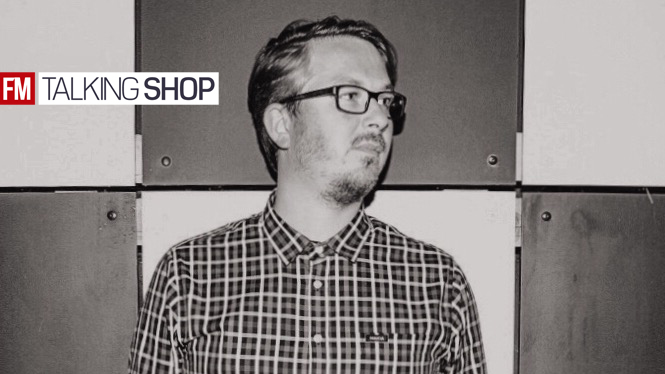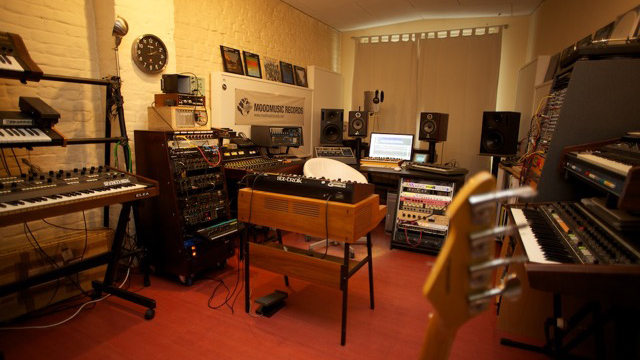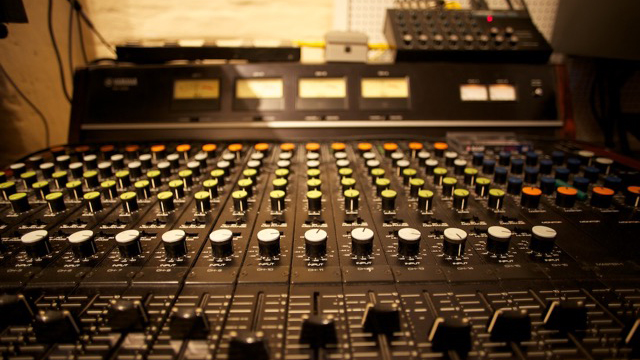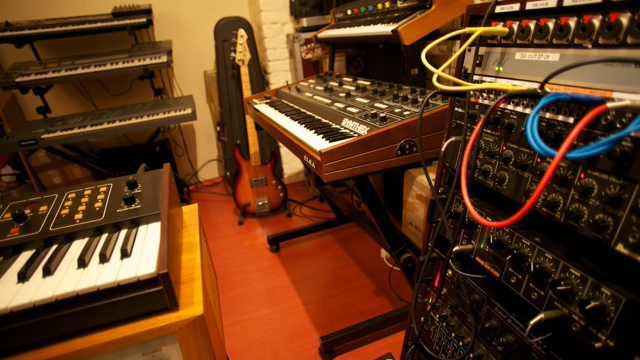Talking Shop: Sasse
The Moodmusic boss invites us into his Blackhead Studios

Want all the hottest music and gear news, reviews, deals, features and more, direct to your inbox? Sign up here.
You are now subscribed
Your newsletter sign-up was successful
With over two decades spent working in electronic music, Berlin-based producer and engineer Klas Sasse Lindblad knows a thing or two about getting the most out of studio technology.
At his own Blackhead Studios in Berlin, he's been behind the boards for a broad range of ambitious artists, while his Moodmusic label sees Lindblad keeping dancefloors stocked with tracks from the likes of Botoko, Mario Basanov, and Frankie & Sandrino. As a solo artist he's no slouch either, as demonstrated by December's lush, arp-driven single Eko Masala. FM caught up with Sasse to find out more about his studio approach.
When did you start making music, and how did you first get started?
"I started to DJ in 1989 in my hometown and slowly got into production as well through friends and wanted to build up a small home studio around '90-'91. The first gear was an Ensoniq Mirage sampler, a Yamaha TG33 synth and a drum machine, although I can't remember what it was. It must have been one of the cheaper Roland TR series, maybe a 505 or 626. I also built a one shot sampler from a mail-order kit, which I used to sample longer speeches or sound effect. That was amazing as sampling time back then was usually really short and the real samplers were expensive.
"This was around '90-'91 and we produced everything from Breakbeats to House and Techno. It was all written and produced as a collective. So I guess we were doing electronic music within a very wide range. We did straight up dancefloor stuff as we used to do warehouse parties in the early '90s, but some tracks were surely more experimental too. My own first proper productions that ended up on vinyl were done around '93-'94 so it took a few good years to learn the basics."

Tell us about your studio/set-up
"I run a commercial studio in Berlin called Blackhead Studios. We have two main rooms and a small production room, For the last ten years we've been in the Prenzlauer Berg district in central Berlin. I was sharing the space with Ewan Pearson until now, but he has moved back to the UK so I have taken over the whole space.
Want all the hottest music and gear news, reviews, deals, features and more, direct to your inbox? Sign up here.
"My room is an analogue/digital mixing and production room with a nice selection of vintage keyboards, drum machines and my modular system. My monitoring is Genelec 1032s as main monitors, and Focal 6B Solos as near fields.
"I do use plug-ins as well, but mixing is all done in the analogue domain with a combination of a heavily modded Yamaha PM1000 discrete desk and clean Audient Sumo summing. I have 36 I/O through a RME RayDAT and various AD/DA. My main converter is an Apogee DA16x, which I think sound still amazing due to the Big Ben clocking and the excellent DA. I use a MacPro as my studio computer, so eventually I want to do the laptop and UAD Apollo route to keep up with the future; I can keep most of my converters and I'd be much more mobile so it's a win-win situation."

What DAW (or DAWs) do you use, and why did you choose it?
"I use Pro Tools 11 for mixing and Ableton Live for production. I got into Pro Tools around 13 years ago and was running an HD system for ages, but I love the native Pro Tools now, it ́s just so convenient to run a full session on your mobile rig with no additional hardware than an iLok dongle. I'm thinking about upgrading to 12 but the whole subscription issue is a bit suspect.
"I've been an Ableton user since 1.0 and I have to say I love the loop based approach of it. But lately I've been just doing a lot of modular jams and just been recording those into the DAW. It's a great way of getting away from the well structured Ableton mode."

What one piece of gear in your studio could you not do without, and why?
"I think it's my Yamaha PM1000 mixer. It's not a Neve by a mile, but it has something special in the sound - it ́s so thick and makes software synths sound fat with no EQing. And after the recapping and mods I really think it's a one of kind tool, which I could not live without. Also I love my Pultec EQ clones, they are done by this Polish company ProReplicas which are permanently sitting on my two-buss."
What's the latest addition to your studio?
"I recently got a really good deal on two old digital effects, namely the Dynacord DRP-20 Reverb and a Roland SDE 330 Dimensional Space Delay. I'm a bit of a second hand market junkie so I tend to try a lot of things and if it does not get used I trade them. I've already owned the DRP-20 and I really love the warm '80s modulated reverb and modulation effects. On the software side I bought the Eventide Anthology X plug-in suite upgrade as I'm a big fan of their plug-ins in general."
What dream bit of gear would you love to have in you studio?
"I really want to get a PPG Wave or Waldorf Wave and I'm sure at some point I will stumble across one, sooner or later. I like the approach of analogue and digital hybrid synths, the warmth of the analogue filter/VCA and the digital waveforms. I have a Kawai K3m, which has the same approach of analogue filters and digital waveforms but it's not so flexible modulation wise. For mixing I would like to have the Genelec 1037s installed in my room. I now use the Genelec 1032 as my main monitors, but a three-way would be awesome and I just love the 1037s from the few times I've heard and used them in different mastering studios."
When approaching a new track or project, where do you start?
"I usually jam with my modular and the Arturia Beatstep Pro and Korg SQ-1 - I use Ableton Live as a notepad for anything I want to record, or some chord stuff which I record in Ableton.
"Drum programming is mostly done on analogue gear and I really want to expand my modular drum sounds. There is such a good selection of classic 808/909 type sounds and totally new drum modules. A few of my main units while doing beats is my Jomox XBase 09 and Roland CR-8000 drum machines for just getting a groove, the Doepfer for sequenced lines, bass and additional drums and my Roland Jupiter 8 for anything big and polyphonic. I also use NI Maschine as an additional drum source, which is a good contrast to the analogue crunchiness, it's such a great controller.
What are you currently working on?
"At the moment I work on a follow to the Eko Masala single, which will be a totally different thing musically. It still has a 4/4 electronic groove but is more dark and sinister, maybe even a tiny bit evil. It's all about modulated, heavy bass and moody synths and I look forward to finishing it soon. I also do a lot of mixing and co-producing for other artists so I don't have too much time to produce music myself now a days. When I actually have some of my own studio time I appreciate it a lot more than earlier. I guess it's all about getting old and wise."
Sasse's essential production tips...
Scoop out the resonant frequencies
"One of the most useful tips I learned from a great mastering engineer was to find the resonant EQ points on the kick drum, and in the low end in general. I use the Brainworx bx_digital EQ to scoop any resonant frequencies away, before then pushing the low end up a tiny bit with a hardware EQ. You can do this to most instruments, and thus get a much more punchy and clear tone. After cleaning up most of my drum sounds, I push the low end and top with a pair of vintage Siemens W295b EQs, which have an amazing low-end and silky smooth top end."
Mid-Side mixing
"I use Mid-Side processing in the mixing stage, which is a great way of making space and creating a wide, but mono compatible mix. It's great to clean up the Side channel low end of any unwanted rumble and delay tails which will clutter your mix. It took a while to get into the idea of using MS while mixing, but now I can't get enough of it. I still, of course, use normal EQs and compression, but for that special width and punch it's essential to process the Mid and Side channels separately."
Don't disregard digital
"Don't let the analogue craze take over. I also use a lot of software synthesisers, plug-ins and digital stuff, and it's not always that analogue is better. I personally like analogue EQs and compressors on the two-buss and I mix through a summing device, but for most of my track processing I rely on plug-ins. I love the latest generation UAD plug-ins and the fact that you can run as many instances of a great plug-in is just wonderful. And there are great soft synths, which are so versatile and sound really beautiful so not everything has to be analogue. I think a good mixture of classic analogue and affordable software is the perfect solution."


Future Music is the number one magazine for today's producers. Packed with technique and technology we'll help you make great new music. All-access artist interviews, in-depth gear reviews, essential production tutorials and much more. Every marvellous monthly edition features reliable reviews of the latest and greatest hardware and software technology and techniques, unparalleled advice, in-depth interviews, sensational free samples and so much more to improve the experience and outcome of your music-making.
